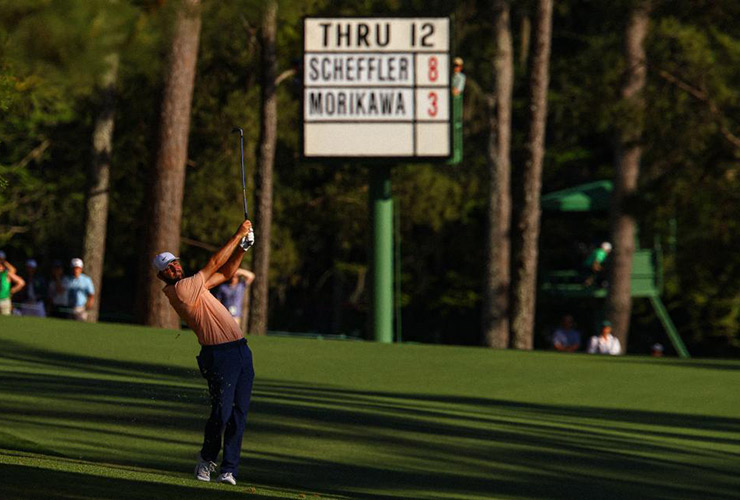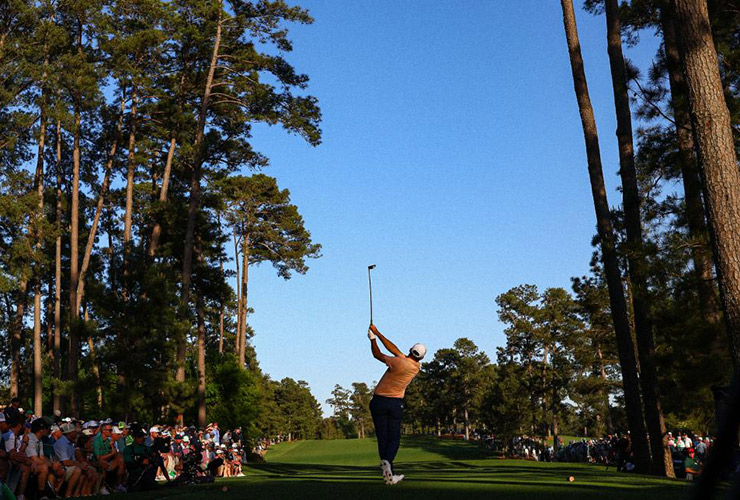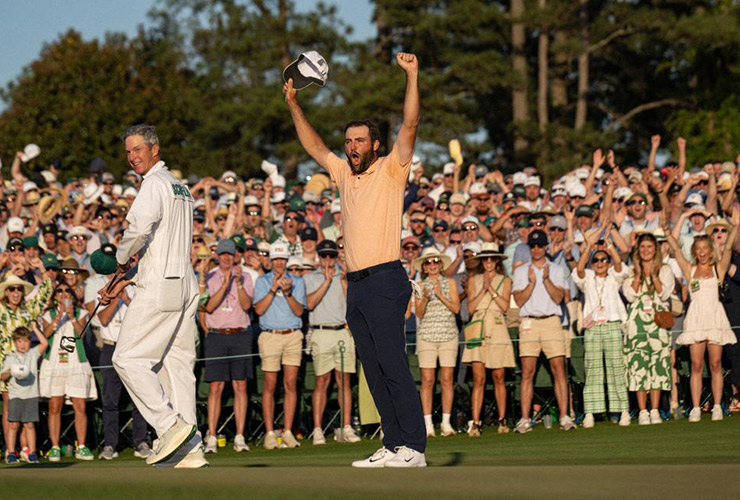What Scottie Scheffler was expected to do, he did, which you’re not supposed to do. Golf is too hard and the professional ranks are too deep. Some will affirm a competition was afoot at the 88th Masters, and as the shadows of the loblolly pines grew there was even a four-way tie at the top, 4:23 p.m., to be exact. Scheffler knew what the clocks didn’t, which is that it was only a matter of time before the four turned into one. Scheffler knew what we should’ve known: This is a man who cannot be stopped.
This was not a week for the dramatic, to make one of those runs Augusta National is notorious for producing. This was a week of attrition, and while others were worn down by the course and the wind or the significance of what they were trying to chase, the unassuming superstar was undeterred by his surroundings, in command of his game and of himself. For that, Scheffler earned his second Masters title.
“No, it’s hard to put into words how special this is,” Scheffler said after his final-round 68 was good enough for a four-shot win. “It’s been a long week, a grind of a week. The golf course was so challenging, and to be sitting here wearing this jacket again and getting to take it home is extremely special.”
Special. That word’s been used a lot recently when it comes to Scheffler. His game is consistent and measured and total, a game that produces rounds that can come off as plodding in the best possible connotation. His greatest sin is that performance, coupled with an unrelenting niceness, can come off as mundane. He is not a roguish cowboy, someone who makes a mess by firing first and asking questions later, saving the day in spite of himself. He is a Navy Seal, in and out and mission complete before anyone is the wiser. It’s not as exciting, but that’s the point.
Conversely, the few that are blessed with the ability to make this impossible game look easy can view that as a curse, for when the performance inevitably falls short of the impossibly high bar it is viewed as a disappointment. (That sound you hear is Rory McIlroy nodding solemnly.) Scheffler knows this burden. Last year he turned in the best ball-striking year of anyone not named Tiger, a performance that beget 17 top 10s in 23 starts. Yet his 2023 was noted for what it was not, his putting problems becoming the primary narrative over the spring and summer. That carried into the Ryder Cup, where Scheffler went 0–2–2 in four matches. “Worry” is too strong a sentiment, yet there was a genuine question if a generational talent could be kept from his potential because of the putter.

Ben Walton
Those concerns were back-burnered heading into Georgia, for while Augusta’s greens are difficult there’s the belief they’re so difficult they actually level the playing field between the good and bad flat sticks. Besides, Scheffler had won the Arnold Palmer Invitational by four and became the first player to defend the Players Championship the following week. More impressive was the aura and reputation he was starting to build; when Wyndham Clark, who had the honour of finishing second at both Bay Hill and Sawgrass, saw Scheffler’s name climb the board that Sunday at the Players, Clark could only say, “Well, of course.” Scheffler had become as inevitable as a high-school crush ending in heartbreak.
“I feel like I’m playing really good golf right now,” Scheffler said of his run, which isn’t so much a run as it is a reality. “I feel like I’m in control of my emotions as I’ve ever been, which is a good place to be. I feel like I’m maturing as a person on the golf course, which is a good place to be. I think it’s hard to argue with the results of the last few weeks. I’ve been playing some nice golf. But I really try to not focus too much on the past.”
Trophies, however, are unfamiliar with inevitability, especially the green jacket. One doesn’t have to look far into this tournament’s past to see what Amen Corner thinks of inevitability. Scheffler held just a one-shot advantage over Collin Morikawa, with Max Homa and Ludvig Aberg barking behind. After three days of U.S. Open-like conditions, there was the assumption the course would be set up for fireworks and drama, which is fun for everyone but the player attempting to keep the field at bay. Theoretically, everything was possible and nothing was assured.
That sentiment didn’t quite make it to the galleries. The crowds always know, for they are mirrors for what they are seeing. Sunday was the type of day you think about when you think about Augusta National, the sun high and the wind down, the patrons dotted in Easter pastels and the air permeated with cigar smoke. And while the Augusta crowds are the most respectful galleries in the sport, they’re also the most educated, and they knew who they were here to witness. On the third, where Scheffler made birdie to extend his lead to two, a man turned to his group and suggested they walk the back because “This one is over.” On the sixth, a patron joked Scheffler should have donned his green jacket from 2022 to intimidate Morikawa, causing another patron to reply, “We wouldn’t get to watch the ceremony afterwards,” a nod to the closing tradition of last year’s winner awarding the best coat in sports to the new victor. The only issue seemed to be how many Scheffler would win by.
For posterity, the issue seemed in doubt, at least in the moment. Scheffler’s ball-striking forgot to make its tee time, missing four of the first seven greens. His competitors weren’t really making a move, yet Scheffler’s troubles opened the smallest window of hope for Aberg, Homa and Morikawa. They soon learned what other Scheffler foes have: it’s the hope that kills you.
Scheffler, who leads the tour in bounce-back birdies, added to his total at the eighth off a nifty up-and-down from the back of the green. He nearly holed-out for eagle from 90 yards that led to a tap-in on nine. Another superb approach at the 10th where he cleaned up the 10 feet that remained.
“I would say the best momentum turner that I had today was the birdie putt on 8. I hit two really good shots in there long of the green. I had an extremely difficult pitch that I hit up there about 10, 12 feet from the cup. It was a challenging read because it turned early and it was really straight at the end,” Scheffler said. “That kind of gave me some good momentum, and I used that to birdie 9 and 10 and keep pushing because I knew there was birdies out there on back nine. I had a lot of really talented players trying to chase me down, and I knew pars weren’t going to get it done.”
Around the same time, Scheffler’s pursuers met the end of their run. Morikawa found the left greenside bunker at the ninth and kept his third in the sand, leading to a double. Aberg was three under for the day until the 11th, when an aggressive approach met a watery demise. Moriakwa followed Aberg into the pond. The 12th rang its Golden Bell on Homa, who’s tee shot ended in a bush and resulted in a 5. Scheffler responded with a four-corners offence the situation called for, making it through Amen Corner unscathed. Plodding, sure. Today, plodding was good.
For good measure, Scheffler went for the par-5 13th in two, put his approach to a foot at the 14th and dropped a nine-footer for birdie at the 16th to put the tournament on ice. Turns out there’s some excitement to his game after all.

Ben Walton
So what do we make of Scheffler? Nine wins in the last 26 months, two of them Masters, carving out the distance between himself and the rest of the sport that makes the expanse of the Grand Canyon seem small. He is not just a star; he’s perched on stardom’s cliffs, listening to his name echo off the walls below. Here is what those echoes are relaying:
“I mean, everything,” Morikawa said when asked what Scheffler is specifically doing. “He drives the ball plenty, plenty long, well past me. Hits his irons obviously spectacular. Keeps it simple. Makes the putts when he needs to. If he doesn’t, still has plenty of chances. And just never put himself in trouble.”
“Scottie is an unbelievable golf player, and I think we all expect him to be there when it comes down to the last couple holes of a tournament,” Aberg said. “He’s proven it again and again, and I think, you know, he makes us better.”
“His commitment, his mind. He is pretty amazing at letting things roll off his back and stepping up to very difficult golf shots and treating them like their own,” Homa said. “He’s obviously a tremendous talent, but I think that is his superpower.”
They all spoke with respect, but also in dazed resignation. They had given their best and it didn’t matter, because there’s no punch that can knockout a brick wall.
That’s all well and good, and his performance over the past two years begs questions of where he might go and what he can achieve. Yet part of Scheffler’s appeal is the person behind the player. Scheffler has never been afraid to be vulnerable, to let us know he’s defined by his family and faith. He’s also a competitor with a fire that he’s unable to control. Scheffler does not enjoy how much winning consumes him yet that is his truth.
“I wish I didn’t want to win as badly as did I or as badly as I do. I think it would make the mornings easier,” Scheffler said. “But I love winning. I hate losing. I really do. And when you’re here in the biggest moments, when I’m sitting there with the lead on Sunday, I really, really want to win badly.”
Sometimes the fire burns too hot. Two years ago Scheffler admitted the gravity of what could be was too much to handle Sunday morning, stressing him out to the point where he “cried like a baby.” There were no tears this year, or worries that he wasn’t ready for what’s ahead. Yet to think Scheffler was obtuse to what was on the line is wrong. Scheffler said he was antsy, he was stressed. Scheffler said he wasn’t having fun this week, that he couldn’t, there was too much to do and he knew how hard it would be. We saw that Saturday night. Scheffler casts an imposing shadow, his 6-foot-3 height, wide frame and no-nonsense glare making him look like the guy who comes knocking on your door when rent is three months late. But when he walked off the 18th green Saturday evening, Scheffler was far from imposing, his mighty shoulders slumped by the invisible weight that comes with the supposition of greatness.
Maybe that’s why, when the final putt disappeared, we saw the usually-stoic Sheffler emote, clinching both fists down and letting out a primal scream. He took his hat off and greeted his coach, his agent, his family, his smile somehow brighter than the emerald green rolling beneath his feet. It was the silhouette of a man freed of the weight through a stubborn will only he can measure. A reminder that greatness looks easy to us because we can never know the cost of the struggle.
Scheffler began to make his way off the course, only to realize his family remained behind. Scheffler impatiently looked back and motioned for them to get going, with Scheffler’s caddie Ted Scott ultimately leading the way through the patrons. Scott had the 18th flagstick in hand, a tradition for winning caddies. With the thousands of patrons that engulfed the temporary walkway between the 18th green and the clubhouse, it looked like Scott was leading a parade with the flag in tow. Technically, he was. Golf has a new ruler, and it’s who we expected it to be.
Main Image: J.D. Cuban









